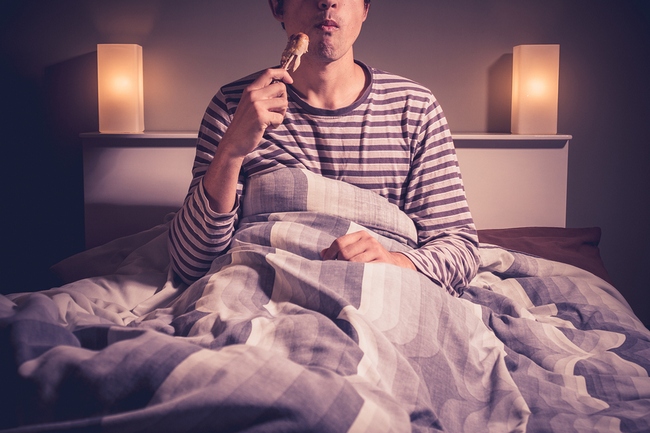- Make It Yourself Lavender Heart-Shaped Bath Bombs!
- 20 Things You Never Knew About “Down There”
- 12 Best Foods For Those Suffering From Arthritis Pain
- 12 Personal Hygiene Mistakes Almost Everyone Makes (Mom Never Told You About #4!)
- 15 Medicinal Plants And Herbs From The Cherokee People
- 12 Mind-Blowing Benefits Of Drinking Coconut Water During Pregnancy
- 12 Outstanding Winter Foods That Won’t Fatten You Up Like A Christmas Turkey
4 Ways to Combat Health Risks in Your Bedroom

Photo credit: bigstock
Anytime you get the sniffles, the flu, or any other type of illness, or even an injury, the one piece of advice you are sure to hear over and over is: Get plenty of rest. It seems everyone knows that getting sufficient amounts of sleep will help our body to heal and recover more quickly but what about those of us who can’t seem to get that deep, quality sleep we need? Just how important is getting enough sleep, anyway?
Not getting sufficient amounts of sleep has been linked to several serious health concerns.
- Heart disease: a lack of sleep causes your immune system to respond with inflammation of the cardiovascular system. This is because your body feels that a lack of sleep is a perceived threat, the same as an infection or disease. Your body will also produce more stress hormones, which can also lead to heart disease. Add chronic stress to a lack of sleep and you are talking serious trouble for your heart and arteries.
- Colds/Flu/Viruses/Infections: Your immune system is perhaps one of the first bodily systems that suffer from a lack of quality sleep. When you don’t sleep well, or enough, you know it. Your body feels tired, you feel worn out, and that’s not simply a feeling you are having, it’s a fact. Your body is using all your reserve energy sources to fight off those viruses, infections, and exposure to bacteria that might not otherwise bother you if your immune system was running properly. Think your vaccine will save you? You should know that the sleep deprived is much slower to respond to the immunity that the vaccine is supposed to help your body build.
- Diabetes: There has been growing evidence, in the past 10 years especially, that lack of sleep affects your metabolism and hormones in such a way that it encourages the development of diabetes. In 1999, a study published in the Lancet, showed that otherwise healthy men who received only 4 hours of sleep per night, showed huge changed in their glucose tolerance. They have higher than usual glucose levels after just the first week. Remember, these men were healthy subjects who had no history of diabetes or insulin resistance. For those who already suffer from diabetes, lack of sleep leads to extremely poor blood sugar control. This is probably because sleepy people don’t think as well, and therefore, don’t reach for healthy foods or snacks, they aren’t going for a walk during lunch hour, and they aren’t heading to the gym after work. They are going to sit on the sofa because they are so tired! Maintaining control of your glucose levels involves good nutrition and exercise, both of which take a beating when you don’t sleep well.
How do you improve your sleeping pattern? Take a look at the 4 simple things that will keep those health hazards to a minimum by encouraging a good night’s rest.
1. Put away those screens
Not window screens! We mean those electronic screens such as phones, tablets, computers, laptops, and television screens. Shut them off at least one hour before bedtime. Our smartphones, while a miracle of technology that can make our lives easier, they are also our worst bedtime enemies. Read also about health risks of WI FI.
How many of us go to bed with our phone so we can surf Facebook when we should be sleeping? Dump that habit! Half an hour before bed, dim all the lights in the house and start getting ready to wind down. Put on your PJ’s, have a cup of chamomile tea, anything that starts to signal your body that it’s time to sleep.
Consider putting up blackout shades or blackout curtains in the summer months to block out light. There has been mounting evidence that shows that artificial light, even that light from your phone, interrupts your sleep pattern. Staying up 6 or more hours after sundown using artificial lights confuses our bodies and they aren’t sure when it’s time to sleep!

Photo credit: bigstock
2. Use the bedroom only for sleep and sex
Don’t use your bed as your home office or as a TV room.
Keep the clutter and distraction of the day out of the room you want to use for sleep. Keep your bedroom cool, also. When you walk into your bedroom you should notice a clear change from the rest of the house.
Make it cool, dim, and relaxing. Find out 10 great reasons to have sex more often.
3. Move that body
Exercise helps you sleep. Even light exercise, such as a daily walk, promotes better sleep; both quality and quantity.
There is a link between exercise and stress. See best yoga poses for stress.
Stress is one of the major reasons people cite as their inability to fall asleep and exercise relieves stress. Be sure you exercise at least 4 hours before bedtime.
If you wait and exercise too closely to bedtime you might find yourself too stimulated to sleep. So move that body! Manage that stress! Get some serious Z’s.

Photo credit: bigstock
4. Watch what you eat and drink before bed
You don’t want to go to bed feeling stuffed or feeling hungry. Yes, a glass of wine might calm your nerves but it keeps the body awake when your mind wants to sleep. It’s a good idea to not drink alcohol after dinnertime.
Also, eating too close to bedtime tends to cause busy dreams or nightmares which can keep you from getting quality sleep.
Be sure to stop eating at least 2 hours before bed, to allow your body time to digest that food.
Of course, everyone is different and all these rules don’t apply to everyone. Quality sleep is more important than quantity, which is why the typical suggestion of 6-9 hours of sleep is omitted here. You might consider using a sleep tracker which can give you some valuable insights as to your particular sleeping patterns and how much deep sleep you are getting compared to the light sleep. Sweet dreams friends!
Source:


































